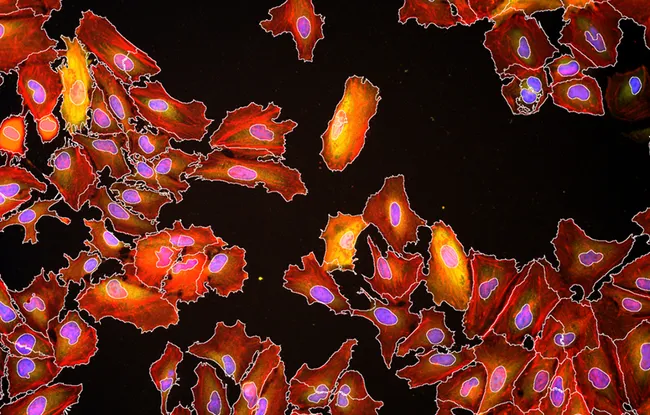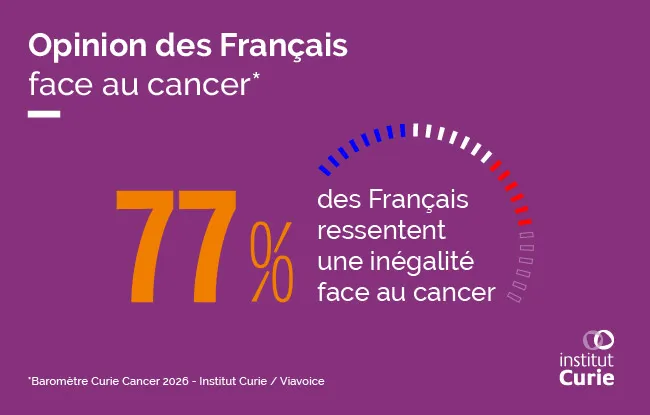- Home >
- Institut Curie News >
- Institut Curie - Institut Pasteur partnership: two joint projects to promote innovation and advancement of knowledge
In 2022, Institut Curie and Institut Pasteur expressed their wish to develop a new collaborative research strategy, to speed up development of joint inventions leading to the emergence of innovative public health products or services. A framework agreement was signed to establish the sharing of scientific skills and technical resources from the two centers in basic, translational and clinical research. This agreement sets out the maintenance and preservation of a state-of-the-art technological infrastructure in the Ile-de-France (Paris and suburbs) region to serve researchers from both institutes.
To initiate collaboration, an exceptional financing package of €600,000 dedicated to supporting both new research projects was implemented. Each group, comprising at least one employee from Institut Curie and one from Institut Pasteur, is granted a budget of €300,000 over two years to complete the work. The MUCTOLIN project and the TicTac project were chosen.
This funding allows Institut Curie and Institut Pasteur to strengthen their collaboration and share their expertise. This partnership will certainly lead to improved knowledge and innovation in infectious diseases and oncology
Explains Prof. Alain Puisieux, director of the Institut Curie Research Center.
The launch of these two major collaborative projects is a highlight of our joint research strategy. With these collaborations, Institut Pasteur and Institut Curie intend to make a significant contribution to the advancement of knowledge in the key fields of biology of infection and cancer
Points out Professor Stewart Cole, President of the Institut Pasteur.
MUCTOLIN project: The role of Mucus-Induced Tolerance during Listeria infection
The aim of this project is to study the role of intestinal mucus in immunity, and more specifically in the ability of phagocytes (macrophages, dendritic cells) to recognize pathogenic bacteria. Dr. Ana-Maria Lennon-Duménil’s team found that the mucus played a role in deactivating intestinal phagocytes. Marc Lecuit’s team showed that, at invasion, the pathogen Listeria monocytogenes was covered with mucus. Based on these two observations, they hypothesized that by coating itself in mucus, the bacteria could deactivate the phagocytes, which then become incapable of eliminating it and/or present them to the T cells to trigger the adaptive immune response. Intestinal immune tolerance is essential for preventing inflammatory diseases. This work could open up a path for new therapeutic approaches for these diseases, which are a major social issue.
Participants:
Institut Curie: Dr. Ana-Maria Lennon-Duménil, director of the Immunity and Cancer research unit (Inserm U932) and head of the Spatio-temporal dynamics of immune cells research team (Inserm U932)
Institut Pasteur: Marc Lecuit, head of the Biology of infection unit, director of the Cellular Biology and Biology of Infection department, and head of the National Listeria reference center
TicTac project: The IntraCellular geomeTry of cAnCer and development
How does geometry affect the healthy or cancerous status of a cell? Can it pull a stem cell towards one differentiation pathway rather than another? Although we’ve known for a long time that geometry is used to regulate biological information, and that evolution uses it to control the way in which cells handle information encoded in the DNA, many questions remain unanswered. Despite in-depth studies on DNA organization, our understanding of the molecular dynamics of nuclear compartments without membranes remains incomplete. Teams from Institut Curie and Institut Pasteur will try to decipher the influence of histone H3 variants on cell destiny in cancer (as well as in other pathological contexts) and during development. This project would provide new approaches to understand the coding of geometric information in a cell.
Participants:
Institut Curie: Dr. Geneviève Almouzni, head of the Chromatin Dynamics research team (CNRS UMR3664/Sorbonne University), Dr. Bassam Hajj, CNRS research scientist in the team of Dr. Mathieu Coppey, Light-based Observation and Control of Cellular Organization (CNRS UMR168/Sorbonne University)
Institut Pasteur: Jean-Baptiste Masson, head of the Decision and Bayesian Computation five-year group; Jean-Yves Tinevez, head of the Image Analysis Hub; Spencer Shorte and Nathalie Aulner, heads of the Photonic BioImaging (UtechS PBI) technology and service unit (S. Shorte is also head of the Center for Technological Resources and Research); Stéphane Fournier, Vice-President Information Systems.



